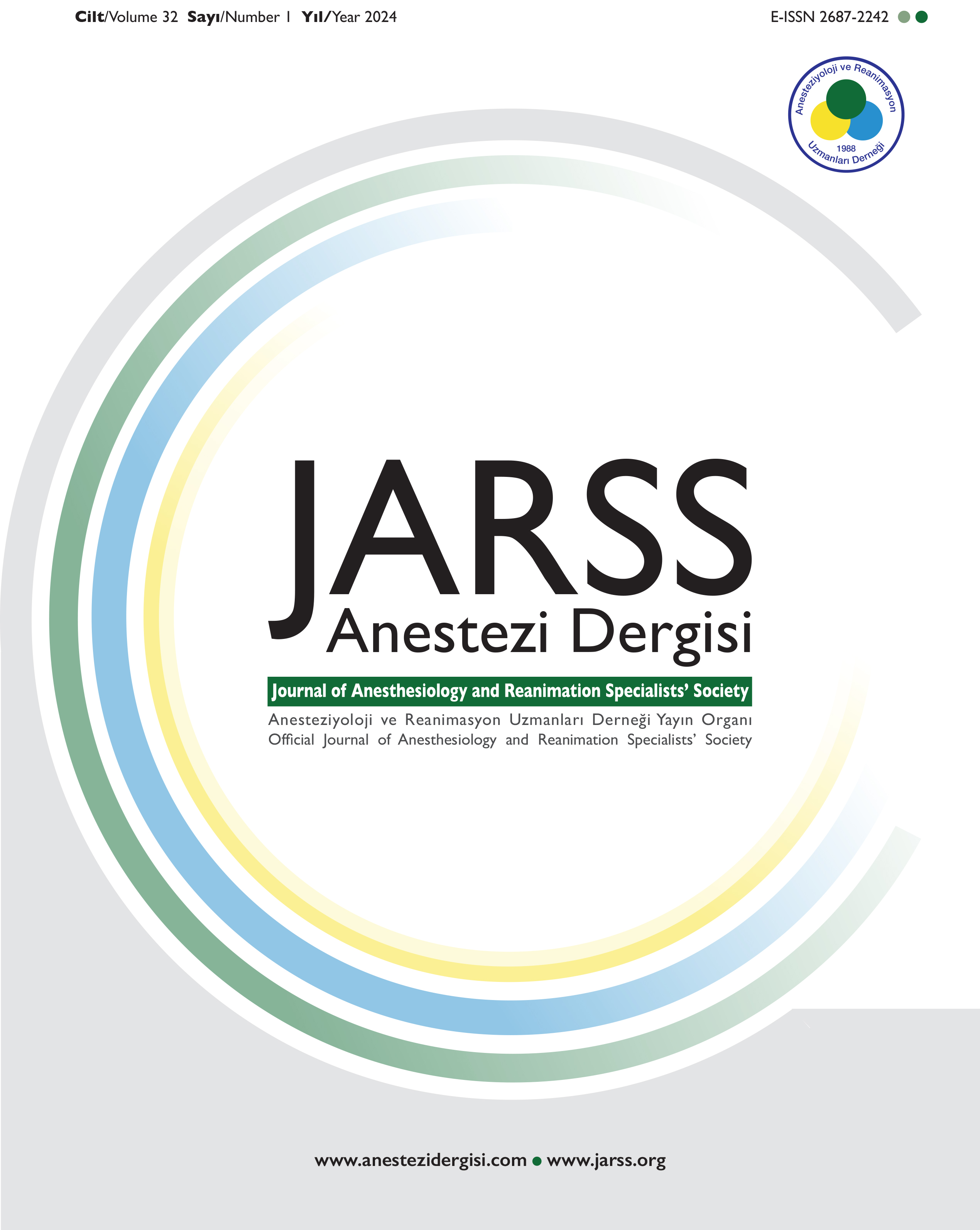Geriatrik ortopedik cerrahide postoperatif mortalite ile ilişkili faktörler: Tek merkez verilerinin retrospektif analizi
Gamze Küçükosman, Hüseyin Öztoprak, Tuğçe Öztürk, Hilal AyogluBülent Ecevit Üniversitesi Tıp Fakültesi, Anesteziyoloji Ve Reanimasyon Ana Bilim Dalı, ZonguldakGİRİŞ ve AMAÇ: Çalışmamızda ortopedik cerrahi uygulanan 65 yaş ve üstü hastalarda postoperatif mortalite ile ilişkili peroperatif değişkenler ve anestezi ile ilişkili faktörler değerlendirildi.
YÖNTEM ve GEREÇLER: 2015-2017 yılları arasında ortopedik cerrahi geçiren ≥65 yaş hasta kayıtları retrospektif olarak incelendi.
BULGULAR: Araştırmaya 135 hasta dahil edildi. Operasyonların %26’sını total kalça protezi, %24’ünü alt ekstremite kırığı, %18’ini total diz protezi, %17’sini ampütasyon cerrahisi ve %14’ünü üst ekstremite kırığı oluşturuyordu. Amputasyon cerrahisi geçirenlerde postoperatif mortalite oranı (%76.9) en yüksekti (p<0.05). Bölgesel veya genel olsun, anestezi tipinin mortalite ile ilişkili olmadığı bulundu. Mortalitenin artan yaş, ≥3 ASA skoru, acil cerrahi, ≥3 eşlik eden hastalık olması, uzun preoperatif yatış süresi ve preoperatif düşük hemoglobin (Hb) değerleriyle ilişkili bulundu (p<0.05). Postoperatif komplikasyon gelişen, yoğun bakım ünitesinde (YBÜ) izlenen ve mekanik ventilator (MV) gerektiren hastalar ile YBÜ ve hastanede yatışı uzun olan hastalar daha yüksek mortalite oranlarına sahipti (p <0.05). Tüm hastaların% 9.6'sının öldüğü saptandı.
TARTIŞMA ve SONUÇ: Geriyatrik ortopedik cerrahi hastaları arasında cinsiyet ve anestezi metodu hariç, artan yaş, yüksek ASA skorları, acil cerrahiler, eşlik eden hastalık sayısı, preoperatif yatış süresi, preoperatif düşük Hb değerleri, YBÜ-MV gerektiren postoperatif komplikasyonlar ve YBÜ ve hastanede uzun kalış süreleri postoperatif mortaliteyi etkileyen faktörlerdi. Geriatrik ortopedik cerrahi sonrası postoperatif prognozu iyileştirilmede detaylı preoperatif değerlendirmenin ve peroperatif klinik yönetimin gerekli olduğuna inanıyoruz.
Factors associated with postoperative mortality in geriatric orthopedic surgery: a retrospective analysis of single center data
Gamze Küçükosman, Hüseyin Öztoprak, Tuğçe Öztürk, Hilal AyogluBülent Ecevit University Medicine Of Faculty, Department Of Anesthesiology And Reanimation, Zonguldak, TurkeyINTRODUCTION: Our study assessed factors related to anesthesia and peroperative variables associated with postoperative mortality among patients ≥65 years who had undergone orthopedic surgery.
METHODS: Reports on patients ≥65 years who had undergone ortopedic surgery between 2015 and 2017 were investigated retrospectively.
RESULTS: The study included 135 patients. The operations comprised 26% total hip prosthesis, 24% lower extremity fractures, 18% total knee prosthesis, 17% amputation surgery and 14% upper extremity fractures. The postoperative mortality rates were highest (76.9%) among who underwent amputation surgery (p<0.05). It was found that anethesia type, whether regional or general, was not related to mortality. Mortality was found to be associated with increasing age, ≥3 ASA score, emergency surgery, ≥3 accompanying diseases, long preoperative admission and low preoperative hemoglobin (Hb) values (p<0.05). Patients developing postoperative complications, those who were monitored in intensive care unit (ICU) and required mechanical ventilator (MV), and patients with long admissions to ICU and hospital had higher mortality rates (p<0.05). Among the all patients, 9.6% were known to have died.
DISCUSSION AND CONCLUSION: Among geriatric ortopedic surgery patients, apart from gender and anesthesia method, increasing age, high ASA scores, emergency surgery, the number of accompanying diseases, duration of preoperative admissions, low preoperative Hb values, postoperative complications requiring ICU-MV and long periods of admission to ICU and hospital were all factors that affected postoperative mortality. We believe that detailed preoperative assessment and perioperative clinical management are essential if postoperative prognosis after geriatric ortopedic surgery is to be improved.
Sorumlu Yazar: Gamze Küçükosman, Türkiye
Makale Dili: İngilizce
(936 kere indirildi)












